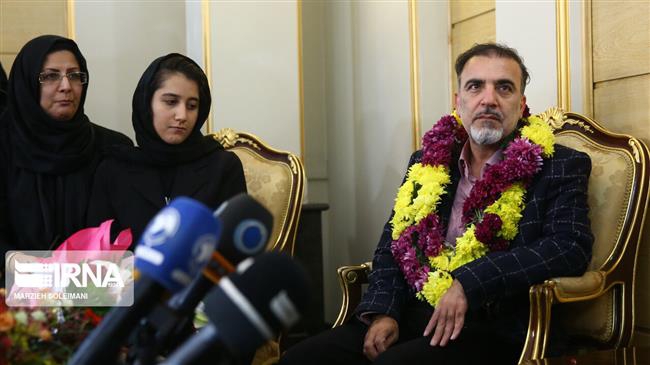Sunday 8 December 2019 - 16:53
Story Code : 365121
US jailers had told inmates I was a terrorist: Iranian scientist
Recounting his ordeal at the hands of American jailers, Soleimani described the United States�as "the number one enemy" of Iran and the Iranians.
Soleimani � who works in stem cell research, hematology and regenerative medicine � was on a sabbatical when he was�arrested by US�authorities upon arrival in Chicago a year ago and transferred to a prison in Atlanta, Georgia.
"US authorities�in the jail had told prisoners that I was�a terrorist who�wanted to carry out bombings in America," he told reporters upon arrival at Tehran's Mehrabad airport on Saturday night.
"They had made such false statements so that other prisoners would not come close to me and keep away from me.
"After a while, the inmates would tell me, 'you do not look like a terrorist and a bomber, what these guys are�saying�and I would�tell them I don't know what they are saying'," he said.
Soleimani had been invited by the Mayo Clinic in Minnesota to lead a research program there, but he was arrested upon arrival and secretly imprisoned without trial by the FBI on October 7, 2018.
FBI authorities reportedly arrested him on charges he had violated trade sanctions by trying to have biological material brought to Iran.
The charges related to September 2016 when Soleimani had seized on two former students' plans to travel from the US to Iran as a chance to get recombinant proteins used in his research for a fraction of the price he�d pay at home. Recombinant proteins are found fundamentally in every medical testing and biological research laboratory.
The students were arrested while departing the United States because they were carrying five vials of the proteins. They were charged in a court and released after posting bail because they held US citizenship.
However, about four months before Soleimani's visit, an attorney in Atlanta had secured his indictment on June 12, 2018, just a month after President Donald Trump withdrew the US from the Iran nuclear deal and announced sanctions under Washington's "maximum pressure" on Tehran.
Soleimani had been fully unaware of such an indictment when he flew to the US. Moreover, Washington had claimed that maximum pressure did not target the supply of medicine and other humanitarian necessities.
"The Americans were so mean and low that when I told them that many patients were waiting for me to have their things done, they said, 'let them die, it doesn't matter'," he said on Saturday.
"This shows their main problem is with the Iranian people. They are upset and angry about the scientific progress and the right path that Iran has taken, and we have a duty to continue this path so that the country can grow and prosper."
Soleimani suffered from several health problems which aggravated during his incarceration.
Iranian Foreign Minister Mohammad Javad Zarif in September said in an interview with NPR that he had pushed for an exchange of a US citizen held in Iran for espionage for Soleimani.
The prisoner exchange came on Saturday that saw the Iranian scientist released for Xiyue Wang.
According to American political analyst Scott Bennett, the Trump administration held the Iranian stem cell scientist hostage to gain leverage over the Islamic Republic through "diplomatic extortion."
On Saturday, Trump bounced on the prisoner exchange to claim a diplomatic triumph at a time when he is under immense pressure while Democratic lawmakers are making a case to impeach him.
�Thank you to Iran on a very fair negotiation,� tweeted Trump. �See, we can make a deal together!� wrote the US leader.
# Tags











